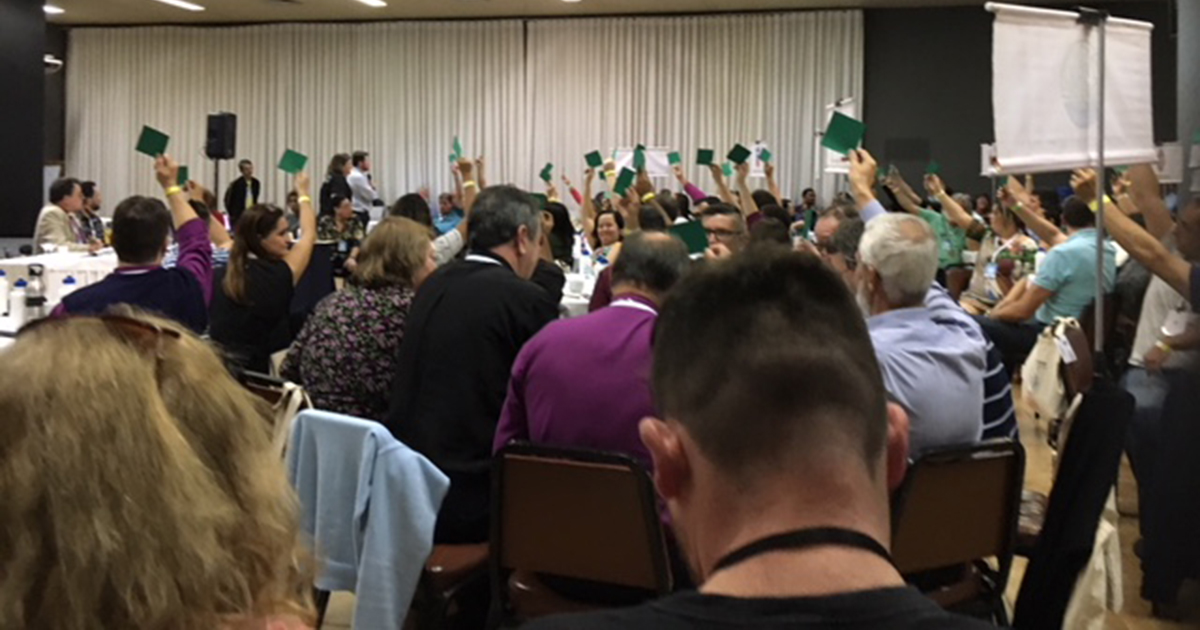Representatives of the Anglican Church of Canada deepened ties with their Brazilian counterparts this month as international guests at the 34th General Synod of the Igreja Episcopal Anglicana do Brasil (IEAB), or the Anglican Episcopal Church of Brazil.
Bishop Linda Nicholls of the Diocese of Huron and Global Relations Director Andrea Mann travelled to Brasilia to attend the Brazilian church’s latest General Synod, which took place from May 31-June 3. Due to scheduling conflicts as a result of his presence at the Council of General Synod, Archbishop Fred Hiltz, Primate of the Anglican Church of Canada, selected Bishop Nicholls to attend as the Primate’s designate.
The two Canadian Anglicans were among a handful of international guests that included the Primus of Scotland Mark Strange, Primate-elect Julip Murray of the province of Central America, Oklahoma Bishop Edward Konieczny―representing Presiding Bishop Michael Curry of The Episcopal Church―and representatives of the United Society Partners in the Gospel from England.
“We are in a conversation with the province to discern renewal of partnership between ourselves and the Brazilian church,” Mann said. “Attending their synod was a good opportunity to reconnect with leaders of the church and to listen to reports and have conversations both with the leadership and synod delegates, but also with the Brazilian church’s other international partners.”
A small but growing Anglican province
The IEAB is a relatively new province of the Anglican Communion, having officially joined in 1965 as its 19th ecclesiastical province. With a membership of approximately 120,000 in a country whose population exceeds 200 million people, the IEAB is a small but growing church that has a reputation for inclusivity.
Total attendance at the IEAB General Synod was estimated at 65 people representing 10 dioceses, each of which has three laity, three clergy, and one bishop. Reflecting the relative newness of the province itself, much of the conversation at the Synod involved efforts to establish new canons, clarify working relationships, and find financial stability for dioceses and as a provincial synod.
As a representative of the Primate and her own Diocese of Huron, which has a companion diocese relationship with the Diocese of Amazonia in Brazil, Bishop Nicholls described an atmosphere of camaraderie and solidarity at the synod.
“It’s a real privilege to sit and watch another church at work in its life,” the bishop said. “There was an informality to the provincial synod that our General Synod [in Canada] would find curious. There isn’t the same strictness about rules of order, but there’s a wonderful spirit of joyful participation and passion about what they’re doing, and that was good to see.”
Same-sex marriage resolution
Aside from the election of a new Primate, Bishop Naudal Alves Gomes, one of the most significant developments at the Brazilian General Synod was the passing of a resolution permitting same-sex marriages in the church.
The resolution has obvious parallels to the debate facing the Anglican Church of Canada as it heads into General Synod 2019 in Vancouver, where members will vote on the second reading of a similar amendment to their own marriage canon.
Bishop Nicholls noted that Brazilian Anglicans have gained an identity among the wider churches of Brazil as “a church that has claimed very strongly the principle of inclusivity and justice … There were a number of LGBTQ people, both lay and clergy, that are part of the church, and that intense commitment to inclusivity was a strong factor in this―but not exclusively, because there certainly were rural dioceses that expressed concern over this.”
In the end, the resolution to permit same-sex marriage passed overwhelmingly, with 57 voting in favour and three against.
Despite the disparity in votes, Bishop Nicholls described a relationship among those in attendance based on a clear sense of mutual respect.
“It was a very strong vote, and I think the reason was that the people who were opposed felt that there had been space created for them by allowing it to be at the discretion of the bishop, which gave them a place where if their bishop was not in favour, they didn’t feel they would be forced into anything,” Bishop Nicholls said.
“I was moved by the fact that when the vote happened, and there was great joy amongst those who had been working towards this for some time, those who were opposed kept a gracious silence,” she added. “They weren’t angry, they weren’t upset, they didn’t stomp out of the room, they didn’t make it clear that they were unhappy. They just quietly sat and let the others who felt strongly about this have that moment. And that was different than some of what I saw at our last General Synod.”
Deepening relationship
As the new Brazilian Primate prepares to take on his new responsibilities, the IEAB and the Canadian church continue to make plans to strengthen their national and international commitments to social and ecological justice―priorities highlighted by Bishop Gomes’ predecessor, Bishop Francisco de Assis da Silva, in his 2016 presentation to the General Synod of the Anglican Church of Canada.
Following a request by Archbishop of Canterbury Justin Welby for regional consultations of all Primates before the Lambeth 2020 conference, Archbishop Fred Hiltz volunteered to host a meeting of Primates from the Americas in Ontario this November. Though logistics remain to be worked out, Mann expressed hope that Primate Gomes would be able to attend the gathering.
“My impression about the relationship between our two churches is that there is certainly a spirit of friendship and mutual interest, and respect in the other’s ministries and contexts for church development and church ministry. […] There is an interest in seeing where we might go further and more substantially from here.”
Interested in keeping up-to-date on news, opinion, events and resources from the Anglican Church of Canada? Sign up for our email alerts .

